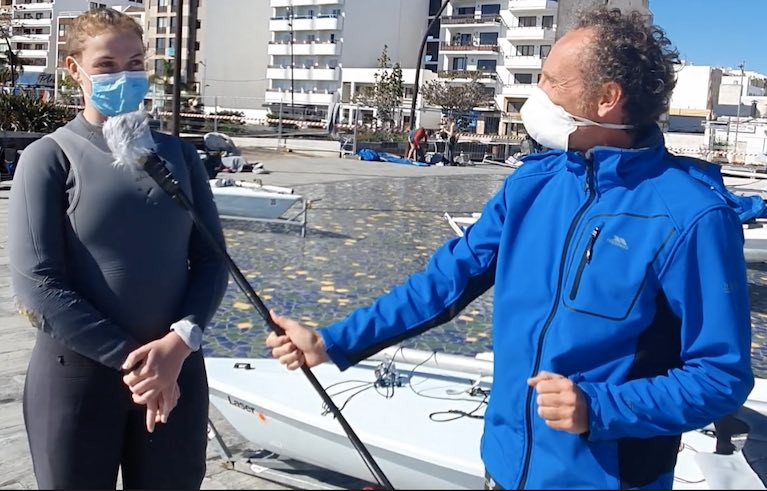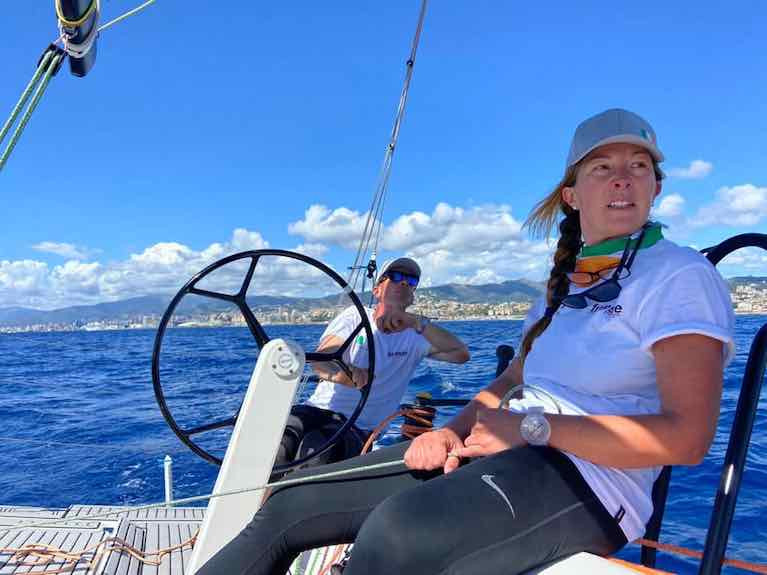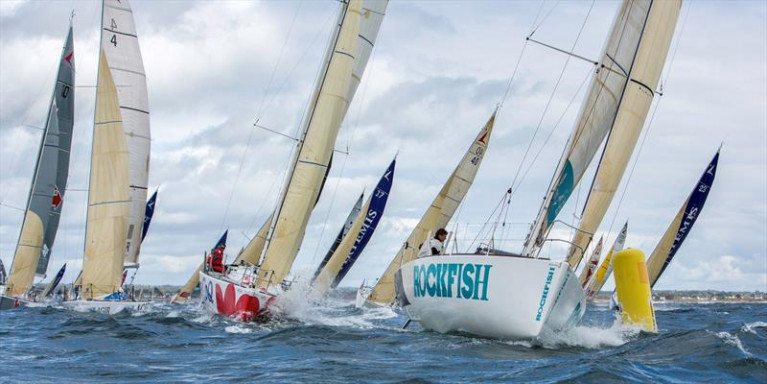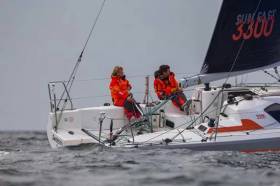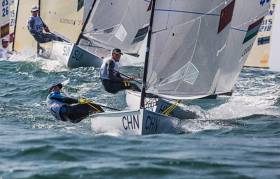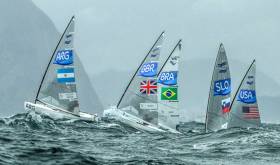Displaying items by tag: Paris 2024
Olympic Federation Seek Two Independent Non-Executive Directors
The Olympic Federation of Ireland (OFI) today announced that it is seeking applications for two voluntary Independent Non-Executive Directors (INED) positions to serve on its Executive Committee (Board of Directors) for the Olympic cycle to the Paris Summer Games in 2024.
This opportunity comes at a time when strong progress is being made across all areas of the OFI’s 2018 – 2024 strategy. The Independent non-Executive Director positions will provide successful candidates with the opportunity to contribute to a focused, diverse and passionate Board with a clear vision for the current Olympic Cycle.
The appointment of two independent Directors represents one of a number of Governance reforms that have been introduced recently, including term limits and minimum gender representation, which has led to a 50/50 gender-balanced Board.
Besides strong leadership ability and vision, candidates will share the passion of the Board for the development of Olympic sports in Ireland, and will demonstrate expertise and experience in at least one of following areas:
- Strong financial expertise and financial governance experience
- Proven track record of business leadership
- Public Affairs experience
Odgers Berndtson have been engaged to manage the process and the deadline for applications is midday on 30 April 2021. Interested candidates can find out more about the position and how to apply here.
Announcing the recruitment process, Sarah Keane, Olympic Federation of Ireland President said,
“This is an exciting opportunity for independent candidates with the right skill-sets to contribute to a focused, ambitious and highly motivated Board. Our vision for the future is centred on putting athletes first and inspiring the nation through their success, while achieving financial independence and ensuring the highest standards of oversight and governance.
“We believe that the addition of two independent Directors will enhance our work and will assist us in taking advantage of the exciting opportunities that exist during this period for the promotion of Olympic sports.”
Olympic Mixed Two-Person Offshore Keelboat on Ice As World Sailing Looks to Preserve Tenth Medal in Paris
At an online meeting of Member National Authorities (MNAs), World Sailing (WS) today (April 16th) will convey the news that the International Olympic Committee (IOC) had requested WS to provide details of an alternative event should the IOC not endorse the mixed two-person offshore event for the Paris 2024 Olympic Games at the IOC meeting at the end of May.
The International Olympic Committee has given World Sailing six weeks to come up with alternative events to the controversial Mixed Offshore keelboat proposed for the 2024 Olympic Sailing regatta in Marseille, France.
While this is not a final decision, it is a clear indication that the offshore event is unlikely to be approved.
In November 2018, following a lengthy debate, the WS Council voted to replace the Mixed One -person dinghy event with the Mixed Two Person Keelboat Offshore event. The vote at that stage was 31 to 8 in favour with two abstentions. In the subsequent ratification by the MNAs, 43 were in favour and 17 against with 4 abstentions (note- many MNAs did not have representatives at the meeting and so were unable to cast a vote)
IOC has suggested that WS were unable to answer satisfactorily their questions regarding:
- Field of Play security, scope and complexity and
- Broadcast cost and complexity
Furthermore, IOC noted that (due to Covid), there hasn’t been an opportunity for WS to deliver an Offshore World Championships, which may have addressed these questions.
World Sailing has accepted that the Offshore project will have to put on hold and in the meantime, in order to maintain 10 medals at the Olympics, they will have to submit an event that satisfies IOC in these areas.
A new organisation established to promote 'offshore doubles' sailing attracted 1700 Members from 70 countries in a matter of months when news of the new class broke in November 2018.
Finn & Europe Dinghy Classes Propose Team Scoring Event for Paris 2024 if Mixed Offshore Keelboat is Rejected
As speculation continues to mount over the status of Sailing's tenth medal for Paris 2024 and whether or not the Mixed offshore keelboat will be approved, the following letter from the Finn and Europ dinghy classes was sent to World Sailing on March 31. It recommends that if the Mixed Offshore Keelboat is rejected for Paris 2024, then the tenth event at the 2024 Olympic Games should be the Mixed One Person event, using the Finn as men's equipment and the Europe as the women's equipment.
JOINT SUBMISSION FROM THE INTERNATIONAL FINN AND EUROPE CLASSES
Dear Mr President, Board Members of World Sailing,
finnnlogo100The International Finn Association and the International Europe Class Union would like to make a joint submission for the tenth event at the 2024 Olympic Games, should the Mixed Offshore Keelboat be rejected. The proposed format would consist of a combined team score across a series of races. Team sports are common across the Olympics, so this is something the IOC and spectators can easily identify with.
Both the Finn and Europe classes are well-established international classes with an extensive series of regattas worldwide, and a competitive number of boatbuilders conforming to anti-monopoly regulations, providing lower costs for MNAs around the globe. In addition, they represent a tradition of sailors of different physiques that have written legendary pages in our beloved sport, a legacy worth protecting and whose loss could never be replaced.
Sailing is one of the few sports that can cater for Men and Women of different physiques. Conscious of that responsibility, World Sailing rules have always guaranteed Olympic options for these sailors to continue a tradition dating back to the early years of sailing. That same reason led the Council in 2017 to pledge that sailors with different physiques would have an opportunity to compete at the 2024 Olympic Sailing Competition (Submission 70-17).
Europe class logo175The inclusion of our Classes in the Olympic programme is the only solution that would permit heavyweight men and medium-lightweight women to be competitive and enjoy our sport, while maintaining absolute gender and event equality across all ten events. The Mixed One Person event would continue the tradition of providing a technical challenge to sailors at the Olympics, while catering for different sailor physiques and facilitating improved investment in female sailors around the world.
More importantly, perhaps it would also keep many top sailors in Olympic sport that otherwise would give up after Tokyo as there would be nothing left for them to sail.
The Finn class has unique links to the America’s Cup and plays a key role in a long-held pathway through the sport. The Europe class is a previous Olympic class with many of the same technical qualities as the Finn and is still flourishing worldwide. That legacy must be maintained.
We would like to reassure you of our best intentions to make this workable and a success, and we hope you will give this proposal serious consideration.
Kind regards,
Dr Balazs Hajdu, President, International Finn Association
Paul Depoorter, President, International Europe Class Union
Speculation is mounting that sailing's highly anticipated mixed offshore keelboat for the Paris 2024 Olympic Games may not be approved by the International Olympic Council (IOC) at its meeting next month.
When World Sailing received feedback from the International Olympic Committee (IOC) on the event programme for Paris, the IOC approved only nine of the ten events in December 2020.
The 2024 programme had incurred a significant overhaul to meet new requirements by the IOC, with the introduction of the new Mixed Two Person Offshore Keelboat Event expanding the sailing competition beyond dinghies and boards and beyond closed-course racing.
While this event has helped to increase interest in shorthanded sailing, the IOC wanted to further review the event in order to properly assess the key considerations around safety and security of the athletes, with a decision to be no later than May 31, 2021, as Afloat previously reported here
It's not the first time that the decision over the offshore keelboat has been questioned either. A leading offshore sailor and former Admiral of the Royal Ocean Racing Club (RORC) in London says because of the 'possible loss' of the new offshore keelboat back in December he questioned whether it is worth sustaining the connection of the offshore world with the World Sailing body.
Campaigns (including three Irish parings and one currently racing off France) planning for 2024 are coming to terms with the fact Paris may now be a '50/50' chance?
The doubts come as the Finn class seeks to regain its Olympic place for 2024 through an innovative collaboration with a former women's Olympic class, the Europe dinghy.
It seems the fight for the tenth medal at Paris 2024 is well and truly underway.
Howth ILCA 6 Sailor Eve McMahon Interviewed at Lanzarote Winter Series on Paris 2024 Ambitions
Annalise Murphy’s training partner Eve McMahon of Howth Yacht Club was interviewed today at the Lanzarote Winter Series. Watch the interview below.
The young Irish Olympic aspirant was talking to Laser coach Jon Emmett about today’s breezy conditions that saw a number of broken rigs.
The Irish and Danish sailing teams have teamed up for some winter training in the Canary Islands so it's turned out to be quite a training camp for the 16-year-old Dubliner who is this week away from the schoolbooks and instead lining-up with the Rio silver and bronze medalists.
 A determined Eve McMahon of Howth Yacht Club in today's strong downwind legs of the Lanzarote Winter Series
A determined Eve McMahon of Howth Yacht Club in today's strong downwind legs of the Lanzarote Winter Series
McMahon, who is the youngest competitor on the ILCA 6 circuit, is aiming for Paris 2024 and Lanzarote’s testing conditions today her with plenty of practice.
Annalise Murphy v Ann-Marie Rindom
In 20-knots and waves, Murphy broke Ann-Marie Rindom’s perfect scoreline and Ireland’s breeze queen earned her first race win in race five. But the Danish Olympic bronze medalist was back on form with a win in race six to lead overall with five wins so far on five points overall. Murphy too counts a consistent scoreline of 3, 2,2,2, and 1 to be on ten points overall in second.
 Anne Marie Rindom of Denmark leads Ireland's Annalise Murphy in the ILCA 6 class of the Lanzarote Winter Series
Anne Marie Rindom of Denmark leads Ireland's Annalise Murphy in the ILCA 6 class of the Lanzarote Winter Series
McMahon is lying in 19th place overall in the 40-boat fleet and had a seventh in race four, her best result of the regatta so far.
Results here. Lighter winds are forecast for tomorrow's penultimate day of racing.
IOC Decision on Olympic Mixed Offshore Keelboat for Paris 2024 to be Made in December
Confirmation that the mixed double-handed Olympic keelboat will be on the slate for Paris 2024 will be decided by the International Olympic Committee (IOC)’s Executive Board (EB) when it sits to confirm the event programme and athlete quotas in December.
There is Irish interest in the mixed offshore keelboat class nominated by World Sailing for Paris. Three teams have declared an Interest with Ireland competing in the EUROSAF Mixed Offshore keelboat European Championships.
A confident World Sailing insider told Afloat the hope is that the debut keelboat class will be granted an 18-boat fleet, aided by the fact that the 2024 Olympics is in France, where the sport of sailing is a big draw.
Of course, it will be a busy agenda for December's meeting with the new Olympic sailing class just one item on an agenda that sees decisions made on requests from 20 of the 27 Olympic International Federations for changes to the Paris 2024 event programme.
Four additional sports are also proposed by the Organising Committee.
The IOC says decisions will be based on the recommendation of the Olympic Programme Commission (OPC) after receiving feedback from the athletes, International Sports Federations (IFs), National Olympic Committees (NOCs) and Paris 2024.
The IOC EB underlined that the decisions should be based on the following previously established key principles:
- Reducing the overall athlete quota (including for all new sports) to 10,500;
- Achieving gender-equal participation across the Olympic Games at the event and discipline level where possible;
- Prioritising new events that accommodate athletes within the sport’s existing quota allocation; and
- New events only if there are existing venues.
“The exceptional situation caused by COVID-19 requires exceptional measures. Therefore, any decision concerning the event programme for Paris 2024 should reflect the Olympic Agenda 2020, including a new phase of the ‘New Norm’. The IOC EB has reiterated the vital importance of reducing the cost and complexity of hosting the Olympic Games, particularly concerning venue requirements,” said IOC President Thomas Bach. “For the event programme, we have maintained the December 2020 deadline, even though new sports can now not be tested on the Olympic stage, but we need to give certainty to the concerned athletes, their NOCs and Federations and the Organising Committee.
Can Irish Mixed Offshore Trial Cancellation Lead to New Plan for Paris 2024 Olympics?
Every cloud has a silver lining and perhaps for Irish Sailing, it has come with the cancellation of the trials series scheduled in Concarneau for the World Offshore Sailing Championships this week.
Its cancellation notice, however, was notably the first Irish Sailing update on these trials. The three trialists have yet to be published. In fact, every aspect of the trials has been conducted privately between a small number of sailors and the Irish Sailing office.
Back in December, as news of the 2024 Olympic class was announced, Irish Sailing said 'while it will facilitate the process for the selection of a team, it should be noted from the outset, that Irish Sailing has no budget for this event and all costs will be borne directly by the teams competing'.
Irish Sailing has done well to maximise the investment in its High-Performance programme to date. Accounts show a total of over €3m on funding between 2017 and 2020. Now that Offshore sailing has a place in the Olympics, it must be included in the planned investment for the next cycle. Offshore is a discipline with which we are familiar and unlike most of the Olympic classes, forms a significant part of our national sailing scene. We are not without talent, and the opportunity, especially in a one boat per nation event, must be matched with the available resources to develop a strong development programme with Paris 2024 in mind.
Hopefully, March's cancellation will encourage Irish Sailing to review the way in which this opportunity has been handled, perhaps learning from the open and transparent way, for example, the RYA has conducted its offshore trial.
When World Sailing decided to include Offshore Sailing in the Olympic Games, Irish sailors were delighted to see an opportunity for easier access to the pinnacle sports event in an area where Ireland has displayed some strength.
At that time, imaginations overflowed about how this could impact positively on the development of sailing, with a particular shift towards female participation.
In the Sport Ireland commissioned Rio 2016 review, it was recommended the sport could benefit from 'more class competition within Ireland'. Other than the Laser dinghy, there is no domestic competition in Olympic classes here. This new keelboat is an opportunity to make Olympic sailing more visible and part of the national sailing scene where more than 70% of all racing is now in keelboat classes. What's more, it's a chance for Irish Sailing to deliver on the 2016 recommendation.
Qualification for the Worlds, a precursor to any Olympic campaign, could be in boats that already exist, at events that already exist, using a rating system, without the huge costs associated with Olympic campaigning. Double-handed male/female elements could be added to ISORA, Round Ireland, Dun Laoghaire-Dingle and similar events, enhancing those, encouraging participation and providing ready-made training opportunities.
The hopes for this were dashed when Irish Sailing, in a private communication to a few who had declared interest, decided the trials for the Offshore Worlds were to be run in Figaro style boats which effectively had to be chartered at a cost of €5,000.
Furthermore, the trials were to take place in France in late March/early April.
Rearrangements for these trials currently underway brings with it the chance for Irish Sailing to be encouraged to establish appropriate, transparent and public procedures for future selection events.
Ultimately, this will mean the winner gets the honour of representing Ireland on the world stage in the knowledge that they have been the best of the Irish in an offshore trial that followed best practice and as a result Irish Olympic sailing moves centre stage on home waters.
‘Unexpected Opportunities For New Sailing Nations’ In Olympic Offshore Keelboat Class
“The tide is turning” on the prospect of offshore sailing at the Olympics, says Seahorse Magazine as it proposes how the new keelboat category could make the sport more accessible than ever.
Last year’s introduction of the Mixed Two Person Offshore Keelboat for Paris 2024 provoked much discussion as to how it might transform the landscape for Olympic sailing — with a number of Irish sailors who has previously never envisaged an Olympic campaign showing interest.
Now that more details have begun to emerge on the new event, Seahorse’s Matt Sheahan writes: “It is becoming clearer that there are important new opportunities with significant benefits to both the sport and the Olympic Games.
“Indeed, some now believe this new discipline could provide unexpected opportunities for new sailing nations, while paradoxically also having the potential to be more affordable than some existing Olympic classes.
“The move is also being seen as having potential to open Olympic sailing up to a broader range of competitors.”
Sheahan points out that the idea has been floated to hold qualifications in chartered boats already available on a regional basis.
World Sailing’s decision on equipment meeting the class’ key criteria may not be made until 31 December next year, or even as late as the end of 2023 — in which case “qualifying nations should have finalised their qualifications before the Olympic equipment is chosen,” says World Sailing president Kim Andersen.
“That way you’re keeping a level playing field for competitors who will focus their efforts on actually getting a medal at the Olympics rather than gaining an advantage through having spent a lot of money and time procuring boats for which there is no demand back home.”
Seahorse Magazine has much more on the story HERE.
Finn Class Makes Eight Submissions To World Sailing Conference To ‘Rebalance The Slate’ In Olympics
The Finn class has made eight submissions to the upcoming World Sailing annual conference in Bermuda in its efforts to ‘rebalance the slate’ of Olympic sailing.
This past summer the one-person dinghy class — which at least year’s conference was removed from the Paris 2024 Games onwards in favour of a mixed two-person keelboat event — suggested a number of ways in which sailing’s world governing body could close the gaps of opportunity for men over 85kg and lightweight women.
These include cutting the number of board events from three (which it says “is not representative of sailing as a sport globally”) to two, or replacing the mixed kite with the Finn. The class does not propose any conflict with the newly introduced mixed keelboat.
The proposals form the basis of the Finn class’ eight submissions, which are available on the World Sailing website and will be reviewed and discussed at the conference which begins this Saturday 26 October.
The Finn class has announced proposals to ‘rebalance the slate’ of Olympic sailing as it identifies a lack of opportunity for heavyweight men and lightweight women.
The mixed one-person dinghy class, which late last year was removed from the Games from 2024 onwards in favour of a two-person keelboat, says the decision now leaves men over 85kg with no chance of sailing at the Olympics.
But it also identified a gap for lightweight women whose opportunities have also been limited, it says.
The International Finn Association now says it is “working on a series of submissions for November to rebalance the Olympic events, providing options for both heavyweight men and lightweight women”.
It is being suggested that kiteboarding becomes a men’s event match by a windsurfing event for women, while the mixed two-person dinghy becomes a women’s event alongside a reintroduced one-person dinghy for heavyweight men.
“It will be a balanced slate that allows for the widest possible spread of participation across genders, weights and nations within the constraints laid down by the IOC,” the class says.
These proposals will form the substance of its submissions to World Sailing for the governing body’s November conference in Bermuda.
And the class is appealing for responses from interested parties to get involved at [email protected] “to help us build a better balanced and more representative slate of Olympic events for 2024”.


























